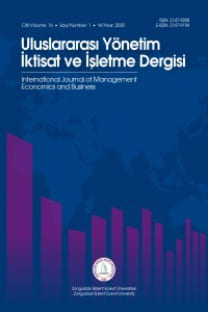GREEN LOGISTICS FOR SUSTAINABILITY
Sustainability is emerging as a salient concept with increasing importance. Since logistics is a core element in enterprise activities, sustainability is becoming a strategic issue for the logistics sector. Sustainability of enterprises is only possible if they are sustainable in terms of their natural, economic and social dimensions. In fact, environmental impacts of logistic practices are now included in “Logistic Performance Index” LPI developed by World Bank. Concept of sustainability and logistics is discussed in this study focusing on environmental, economic and social dimensions of sustainable logistics.
Anahtar Kelimeler:
Yeşil Lojistik, Ekonomi, Sürdürülebilirlik
GREEN LOGISTICS FOR SUSTAINABILITY
Sustainability is emerging as a salient concept with increasing importance. Since logistics is a core element in enterprise activities, sustainability is becoming a strategic issue for the logistics sector. Sustainability of enterprises is only possible if they are sustainable in terms of their natural, economic and social dimensions. In fact, environmental impacts of logistic practices are now included in “Logistic Performance Index” LPI developed by World Bank. Concept of sustainability and logistics is discussed in this study focusing on environmental, economic and social dimensions of sustainable logistics
Keywords:
Green Logistics, Economy, Sustainability,
___
- Alzaman, C. (2014). Green supply chain modelling: Literature review. International Journal of Business Performance Supply Chain Model, 6(1), 16-39.
- Anonymous, (2010). Delivering tomorrow: Towards sustainable logistics. Bonn: Deutsche Post AG.
- Ar, A.A. (2011). Tekstil sektöründen örneklerle yeşil pazarlama. İstanbul: Beta Yayıncılık.
- Atrek, B. & Özdağoğlu, A. (2014). Yeşil tedarik zinciri uygulamalari: Alüminyum doğrama sektörü İzmir örneği. Anadolu Üniversitesi Sosyal Bilimler Dergisi, 14(2), 13-25.
- Bedük, F. & Aydın, M.E. (2012, May). Yeşil lojistik uygulamaları. Ulusal Lojistik ve Tedarik Zinciri Kongresi, Konya.
- Bolat, H.B., Bayraktar, D., Öztürk, M. & Turan, N. (2011, June). Yeşil lojistik zincirinde araç rotalama problemi için bir model önerisi. XI. Üretim Araştırmaları Sempozyumu, İstanbul.
- Büyüközkan, G. & Vardaloğlu, Z. (2008). Yeşil tedarik zinciri yönetimi. Lojistik Dergisi, 8, 66-73.
- Büyüksaatçı, S. (2009). Yeşil tedarik zinciri yönetimi ve bir uygulama. Yüksek Lisans Tezi, İstanbul Üniversitesi, İstanbul.
- Corzine, J.S. & Jackson, L.P. (2006). Green purchasing: A guide for local Governments and communities. Athens, 609, 633-1161.
- Çamlıca, Z. & Akar, G.S. (2014). Lojistik sektöründe sürdürülebilirlik uygulamaları. Gümüşhane Üniversitesi Sosyal Bilimler Elektronik Dergisi, 11, 100-119.
- Elhedhli, S. & Merrick, R. (2012). Green supply chain network design to reduce carbon emissions. Transportation Research, 17(5), 370-379.
- İnce, M.E. (2013). Yeşil tedarik zinciri yaklaşımı ve örnekleri. Konya Ticaret Odası, Konya.
- İpekçi, E. (2013). Lojistikte yeşil çözümler. Retrieved March 25, 2016, from http://www. emreipekci.com/lojistikte-yesil-cozumler.html.
- Hazen, B.T., Cegielski, C. & Hanna, J.B. (2014). Yeşil yayılım tedarik zinciri yönetimi – Yeşil ters lojistik sürecinin algılanan kalitesi üzerine bir çalışma (M.L. Emek, B. Doğan, Çev.). Mukaddime, 5(2), 141-159.
- Kaçtıoğlu, S. & Şengül, Ü. (2010). Erzurum kenti ambalaj atıklarının geri dönüşümü için tersine lojistik ağı tasarımı ve bir karma tamsayılı programlama modeli. Atatürk Üniversitesi İktisadi ve İdari Bilimler Dergisi, 24(1).
- Karaçay, G. (2005). Tersine lojistik: Kavram ve işleyiş. Çukurova Üniversitesi Sosyal Bilimler Enstitüsü Dergisi, 14(1).
- Karl, T.R. & Trenberth, K.E. (2003). Modern global climate change. Science, 302(5651), 1719- 1723.
- Linton, J.D., Klassen, R. & Jayaraman, V. (2007). Sustainable supply chain: An introduction. Journal of Operations Management, 25, 1075-1082.
- Marchant, R. (2010). Understanding complexity in savannas: Climate, biodiversity and people, Curr. Opi. Environ. Sustain., 2(1-2), 101-108.
- Nakıboğlu, G. (2007). Tersine lojistik: Önemi ve dünyadaki uygulamaları. İktisadi ve İdari Bilimler Fakültesi Dergisi, 9(2), 1-16.
- OECD. (2001, November). Strategies for sustainable development - Practical guidance for development. Paris: OECD.
- Rao, P. & Holt, D. (2005). Do green supply chains lead to competitiveness and economic performance?. International Journal of Operations & Production Management, 25(9), 898-916.
- Seuring, S. & Müller, M. (2008). From a literature review to a conceptual framework for sustainable supply chain management. Journal of Cleaner Production, 16(15), 1699- 1710.
- Şişman, B. (2015). Sürdürülebilir tedarik zinciri yönetiminde karbon saliniminin sosyal maliyetini dikkate alan bir model önerisi: Bir mermer işletmesi örneği. Niğde Üniversitesi İktisadi ve İdari Bilimler Fakültesi Dergisi, 8(4), 177-193, ISSN: 2148-5801.
- Tanyaş, M. & Arıkan, F. (2013). Bursa ili lojistik merkez ön fizibilite raporu, BUSIAD, Bursa.
- UBAK. (2014). Türkiye kombine taşimacilik strateji belgesi. Retrieved March 5, 2016, from http://www.ubak.gov.tr/BLSM_WIYS/TMKDG/tr/doc/20150106_122025_64574_1_6 4896.pdf.
- UTİKAD. (2012). Karbon ayak izi takibine çikan çevre ve şehircilik bakanliği yeşil lojistiğinde önünü açacak. Retrieved January 24, 2016, from http://www.utikad.org.tr/ haberler/?id=9963.
- UTİKAD. (2013). Lojistik firmalarinin yeşil olmasi için 10 temel neden. Retrieved March 5, 2016, from http://www.utikad.org.tr/haberler/?id=11348.
- Uysal, O. (2006). Yeşil ürünlerde konumlandırma ile ilgili bir uygulama. Yayımlanmamış Yüksek Lisans Tezi, Marmara Üniversitesi, İstanbul.
- Wang, Z. & Sarkis, J. (2013). Investigating the relationship of sustainable supply chain management with corporate financial performance. International Journal of Productivity and Performance Management, 62(8), 871–888.
- Yangınlar, G. & Sarı, K. (2014, May). Yeşil lojistik uygulamaları ve işletme performansı üzerine bir literatür araştırma. III. Ulusal Lojistik ve Tedarik Zinciri Kongresi, Trabzon.
- Yeldan, E. (2015). Paris’te iklim değişikliği mücadelesi. Retrieved November 5, 2016, from http://www.cumhuriyet.com.tr/koseyazisi/445259/Paris_te_iklim_degisikligi_ mucadelesi.html.
- Yücel, M. & Ekmekçiler, Ü.S. (2008). Çevre dostu ürün kavramına bütünsel yaklaşım; temiz üretim sistemi, eko-etiket, yeşil pazarlama. Elektronik Sosyal Bilimler Dergisi, 26(26).
- Zsidisin, G.A. & Siferd, S.P. (2001). Environmental purchasing: A framework for theory development. European Journal of Purchasing and Supply Management, 7(1), 61-73.
- URL1: Apillioğulları, L. Sürdürülebilirlik. Retrieved March 20, 2016, from http://www. sektorel.com/yazarlar/lutfi-apiliogullari/surdurulebilirlik-sustainability.
- ISSN: 2147-9208
- Başlangıç: 2005
- Yayıncı: Zonguldak Bülent Ecevit Üniversitesi
Sayıdaki Diğer Makaleler
KARAR AĞAÇLARI KULLANILARAK TÜRKİYE HANEHALKI ZEYTİNYAĞI TÜKETİMİ GÖRÜNÜMÜNÜN BELİRLENMESİ
Yunus Emre TAŞGİT, Ebru FETTAHOĞLU
THE RELATIONSHIP BETWEEN FINANCIAL DEPTH AND CURRENT ACCOUNT DEFICIT IN TURKEY
Yunus Emre TAŞGİT, Ebru FETTAHOĞLU
THE DAY OF THE WEEK EFFECT IN BORSA ISTANBUL; A GARCH MODEL ANALYSIS
Mehmet Akif ÖNCÜ, Aslıhan ÜNAL, Oğuz DEMİREL
A STUDY ON THE CONCEPT AND CAUSES OF DESTINATION REJECTION
KADIN ORTAKLI ŞİRKETLERDE DIŞ FİNANSMANA ERİŞİM: TÜRKİYE İÇİN FİRMA DÜZEYİNDE BİR BULGU
Nurullah GÜR, Elmas Yaldız HANEDAR, Önder Avni HANEDAR
KUŞADASI’NDAKİ YİYECEK ve İÇECEK İŞLETMELERİNİN SOLOMO PAZARLAMA AÇISINDAN DEĞERLENDİRİLMESİ
